-
 Art of Wellness Acupuncture & Traditional Chinese Medicine (TCM)11704 Wilshire Blvd, Suite 295, Los Angeles, CA, 90025
Art of Wellness Acupuncture & Traditional Chinese Medicine (TCM)11704 Wilshire Blvd, Suite 295, Los Angeles, CA, 90025
myartofwellness@gmail.com310-451-5522 Office Hours
MonClosedTue7:30 am --4 pmWed7:30 am --4 pmThu7:30 am -- 4 pmFri7:30 am -- 4 pmSat7:30 am -- 4 pmSunClosedOur office opens from Tuesdays to Saturdays 7:30 am to 4 pm, will be closed on Memorial day, Independent day, Labor day, Thanksgiving day, Christmas and New year.
-
Recent Posts
- How to Treat Metabolic Syndrome With Acupuncture and TCM
- How to Treat Syncope With Acupuncture and TCM
- How to Treat Thoracic Outlet Syndrome With Acupuncture and TCM
- How to Treat Dupuytren’s Contracture With Acupuncture and TCM
- How to Treat Nutcracker Syndrome With Acupuncture and TCM
- How to Treat Rosacea With Acupuncture and TCM
- How to Treat Perioral Dermatitis With Acupuncture and TCM
- Lymphatic Drainage With Acupuncture and TCM
- How to Treat Turf Toe With Acupuncture
- How to Treat Nerve Pain With Acupuncture and TCM
- How to Treat Watery Eyes With Acupuncture and TCM
- How to Treat Ovarian Cysts With Acupuncture and TCM
- How to Treat Dystonia With Acupuncture and TCM
- Can Acupuncture Help Bad Breath?
- How to Treat Atopy with Acupuncture and TCM
- Plantar Fasciosis Treatment With Acupuncture and TCM
- Sign up to receive news and updates and get my free report:“The Top 10 Reasons to Try Acupuncture”

September 2025 M T W T F S S 1 2 3 4 5 6 7 8 9 10 11 12 13 14 15 16 17 18 19 20 21 22 23 24 25 26 27 28 29 30
Acupuncture
How to Treat Stomach Ulcer With Acupuncture and TCM
By Qineng Tan, L.Ac., Ph.D. and Xiaomei Cai, L.Ac, Ph.D.
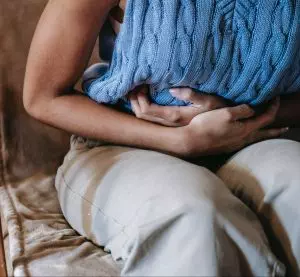
Burning sensation in your stomach? Persistent abdominal pain? Frequent heartburn and indigestion? These could be stomach ulcer symptoms. Acupuncture and TCM can help alleviate ulcer symptoms and reduce inflammation.
Stomach ulcers, also known as peptic ulcers, are painful sores that develop in the lining of the stomach or the upper part of the small intestine. Acid that is naturally present in the digestive tract begins to eat away at the lining of the stomach or intestinal walls. This can cause discomfort, burning pain, and other symptoms that significantly impact a person’s quality of life.
Peptic ulcers may lead to complications if left untreated. In these cases, we may refer to the condition as peptic ulcer disease (PUD).
If the ulcer is near a blood vessel, it can cause internal bleeding. In severe cases, an ulcer can burn through the wall of the stomach, which leads to undigested food and digestive juice leaking out into the abdominal cavity. This is known as a “perforated ulcer” and often requires immediate surgery.
A peptic ulcer can also be so inflamed that it blocks food from moving through the digestive tract, which can cause you to feel full quickly, regurgitate food, and lose weight unintentionally. This is known as “obstruction.”
Ulcers are typically treated with medications and, in more severe cases, surgery. Acupuncture treatment can be used as an alternative or adjunct treatment to help heal ulcers, with or without surgery.
What Causes Stomach Ulcers?
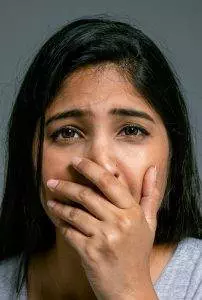
Stomach ulcers are often caused by an imbalance between the digestive fluids and the protective mechanisms of the stomach lining. There is usually a lining of mucus that helps protect the stomach from digestive fluids, but sometimes there is too little mucus and too much acid.
A bacterial infection with the Helicobacter pylori bacteria is often involved in the formation of an ulcer. This bacteria can cause inflammation that affects the stomach lining. Left untreated, an H. pylori infection in the digestive tract can increase your risk for certain types of gastric cancers.
Canker sores, also known as mouth ulcers or aphthous ulcers, can also be caused by the H. pylori bacterial infection. Canker sores can also be related to other gastrointestinal disorders, like Crohn’s disease, or inflammatory bowel disease (colitis).
A rare condition called Zollinger-Ellison Syndrome (ZES), in which a tumor called a gastrinoma develops in the pancreas or top part of the small intestine, can cause excessive amounts of stomach acids to be produced, which can lead to the formation of ulcers.
Long-term use of nonsteroidal anti-inflammatory drugs or pain medication (NSAIDs), like Ibuprofen can also cause inflammation in the stomach.
Lifestyle habits like smoking, drinking too much alcohol, or eating a lot of spicy foods irritate the stomach lining and contribute to the development of ulcers.
Emotional and/or physiological stress can throw off the body’s pH balance, which can also cause excessive stomach acids to be produced.
Top 5 Symptoms of Stomach Ulcers
While it is possible to have an ulcer and not be aware of it because you don’t have any symptoms, most people with ulcers will experience some pain in their stomach.
- Abdominal pain: A burning or gnawing pain in the abdomen, typically between the breastbone and the navel. The pain may be worse when the stomach is empty, such as between meals, and at night.
- Indigestion: Discomfort or bloating after eating, belching, and heartburn (acid reflux).
- Nausea and vomiting: Feeling nauseous and experiencing vomiting, especially after meals. Some people may even vomit blood.
- Loss of appetite: A decreased desire to eat due to feelings of fullness or discomfort.
- Blood in the stool: In severe cases, ulcers can lead to bleeding, resulting in blood in the stool or black, tarry stools.
Other ulcer symptoms can include: changes in appetite, intolerance to certain foods, especially fatty foods, feeling faint, having trouble breathing, and weight loss.
People may feel that the stomach pain is alleviated by eating certain foods that create a buffer against the stomach acid.
While medications and lifestyle changes are commonly used to treat peptic ulcer symptoms, acupuncture and Traditional Chinese Medicine (TCM) offer a holistic approach to address the root causes and alleviate symptoms of stomach ulcers.
Medical Treatment for Peptic Ulcers
When you seek conventional treatment for stomach ulcers, an endoscopy may be performed so that your doctor can see the ulcer(s) and possibly stop bleeding or remove abnormal tissue. Medications may be offered, and in some cases, surgery may be indicated.
Medications for stomach ulcer treatment include:
- Proton pump inhibitors (PPIs): These drugs reduce stomach acid production, allowing the ulcer to heal. PPIs include omeprazole, lansoprazole, and esomeprazole.
- Histamine receptor blockers (H2 blockers): These medications reduce acid production, providing relief and promoting ulcer healing. Famotidine and ranitidine are common H2 blockers.
- Antibiotics: If an H. pylori infection is present, a combination of antibiotics, such as amoxicillin and clarithromycin, will be prescribed to get rid of the bacteria.
Stomach ulcer surgery may be necessary if complications like perforation or obstruction occur.
Repairs to a stomach ulcer can be performed during an endoscopic procedure, where a camera and tools are introduced through the throat.
Minimally invasive laparoscopic surgery can be done through a small incision in the abdomen. Holes in the stomach may be patched with something called a Graham Patch.
If the hole is too large to be patched, then a small part of the stomach may be cut away, and the whole stomach will be closed, and, if necessary, reconnected to the top of the small intestine. This procedure is called a partial gastrectomy.
While conventional medical intervention for stomach ulcers can help bring relief, they do not necessarily prevent the recurrence of ulcers. Medications and surgery do not address the chronic stress that may have contributed to the formation of the ulcers in the first place.
Acupuncture treatment can help restore balance of the emotions as well as gastric fluids. It can also promote healing after ulcer surgery and prevent further occurrence of ulcers. If an ulcer is not yet so severe that surgery is needed, acupuncture treatment may be able to help heal the ulcer before it becomes worse.
Can Acupuncture Help Stomach Ulcers?
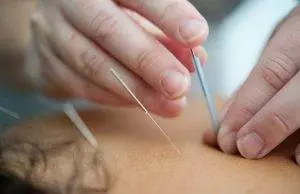
Acupuncture treatment for stomach ulcers, gastric pain, and also canker sores (mouth ulcers), is usually focused on harmonizing the Qi (life force energy) of the stomach and the spleen. Heat and dampness are pathogenic forces that can cause imbalance in the stomach and spleen, while heat and wind in the lungs can also be a factor, from the TCM theory perspective.
Therefore, acupuncture points will be chosen to help strengthen and regulate the stomach and spleen. Acupuncture has been shown to have an effect on the vagus nerve and help reduce overactive acid production in the stomach. Acupuncture also affects the central nervous system, with the effect of reducing pain sensations.
One study compared patients who received acupuncture treatment for peptic ulcers in addition to medication (bismuth subnitrate and amoxicillin) versus patients who received only medications. The patient who also had acupuncture had a higher recovery rate, clearing the H. pylori bacterial infections, and also had a dramatically reduced recurrence rate in the following year after treatment ended.
A laboratory study showed that acupuncture helped to repair ulcerated tissues, reduce the secretion of gastric acids, and improve the condition of gastric mucosa, or stomach lining.
Another study showed that acupuncture treatment for chronic gastritis—inflammation of the stomach lining—was more effective than a drug protocol consisting of proton pump inhibitors, NSAIDs, and antibiotics.
Acupuncture Near Me for Stomach Ulcer – Los Angeles Area
At Art of Wellness Acupuncture and Traditional Chinese Medicine in West L.A., we have over 35 years of experience helping people with gastrointestinal disorders of all kinds. Problems such as nausea, diarrhea, constipation, diverticulitis, colitis (IBD), IBS, and Crohn’s disease can all be relieved by using TCM as an alternative or complementary medicine treatment.
*This article is for education from the perspective of Traditional Chinese Medicine only. The education provided by this article is not approved by FDA to diagnose, prevent, treat and cure human diseases. It should not stop you from consulting with your physician for your medical conditions. Traditional Chinese Medicine is based on Qi, which is an invisible force that usually cannot be observed by modern science. Because science focuses on testing ideas about the natural world with evidence obtained through observation, these aspects of acupuncture can’t be studied by science. Therefore acupuncture and Chinese herbs are often not supported by double-blind, randomized trials, and they are considered alternative medicine therapies in the United States.
How to Treat Hiatal Hernia With Acupuncture and TCM
By Qineng Tan, L.Ac., Ph.D. and Xiaomei Cai, L.Ac., Ph.D.
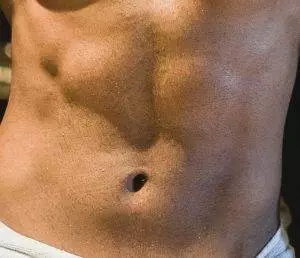
Heartburn and acid reflux? Chest pain or abdominal pain? Vomiting blood, black stool, dark poop? These can be hiatal hernia symptoms. Acupuncture and TCM offer an adjunct or alternative hernia treatment to help relieve hernia pain.
A hernia is what happens when an organ, usually in the abdomen or groin area, pushes through the muscle tissue that surrounds it.
A hiatal hernia occurs when the stomach pushes through the diaphragm—the large muscle that separates your abdomen from your chest.
There is a small opening in the diaphragm—called the “hiatus”— that allows the esophagus to pass through the muscle wall before it connects to the stomach. When a hiatal hernia occurs, the upper part of the stomach pushes through that opening.
It is possible to have a mild hernia and not know it, as it may not cause any pain or other hernia symptoms. A more serious hiatal hernia, though, will cause stomach acid and undigested food to move back up into the esophagus, causing heartburn and possibly chest pain or abdominal pain.
Sometimes it is possible to actually see a hernia, as it may bulge out of the abdomen. Sometimes you can only see it when you cough, or do something strenuous, or even simply stand up.
Hiatal Hernia Symptoms
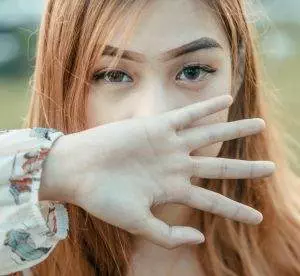
The most common signs of hiatal hernia include:
- Heartburn and acid reflux: One of the most common symptoms of a hiatal hernia is a burning sensation in the chest due to the regurgitation of stomach acid into the esophagus.
- Chest pain: Some people with a hiatal hernia may experience chest pain that can mimic the symptoms of a heart attack. The pain is often described as a dull, squeezing, or pressure-like sensation.
- Difficulty swallowing: A hiatal hernia can lead to a narrowing of the esophagus, making it difficult to swallow. Individuals may feel a sensation of food getting stuck or feel like they’re choking.
- Belching and hiccups: burping or persistent hiccuping can occur, due to pressure on the diaphragm.
- Regurgitation: In addition to heartburn, people with a hiatal hernia may experience the backflow of food or sour liquid into the mouth.
- Chest discomfort after eating: Some people may experience a burning sensation, pressure, or feeling of fullness in the chest area after eating, because the stomach is pressing into the chest cavity.
- Shortness of breath: Larger hiatal hernias can put pressure on the diaphragm and lungs, leading to difficulty breathing, especially during physical exertion.
- Fatigue and weakness: Chronic symptoms of a hiatal hernia can disrupt sleep, resulting in fatigue.
Hiatal hernias are quite common; they may affect as many as half of all people over 50. Hernias may happen because of a generally weakening of muscle tissues.
Hernias can also occur because of some trauma or injury to the area; some hernias happen after a surgical procedure, due to incisions or scar tissue.
It is also possible to develop a hernia during pregnancy or after giving birth.
In many cases, hernia surgery is considered necessary to treat a hernia that is causing symptoms. Acupuncture and TCM treatment offer a way to treat hiatal hernias that may, in some cases, help people avoid a hernia operation.
Top 10 Types of Hernia
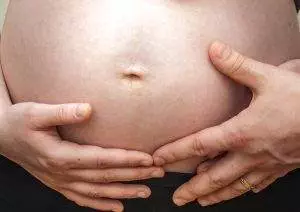
While hiatal hernia and inguinal hernia are the most common types of hernia, there are several other types of hernia, classified mainly according to where in the body they occur.
- Hiatal Hernia: a portion of the stomach protrudes through the diaphragm into the chest cavity, often leading to symptoms like heartburn, chest pain, and difficulty swallowing.
- Inguinal Hernia: Inguinal hernias are the most common type and occur when part of the intestine or abdominal tissue pushes through a weak spot or tear in the lower abdominal wall, often in the inguinal canal. The inguinal canal acts as a passageway for the round ligament of the uterus in women and for the gonadal vessels in men. Inguinal hernias are more common in men and may cause a bulge or swelling in the groin or scrotum.
- Umbilical Hernia: Umbilical hernias occur when the tissue or intestines protrude through a weak spot near the navel (belly button). This type of hernia is more common in infants but can also occur in adults, especially those who are overweight or have had multiple pregnancies.
- Ventral Hernia: Ventral hernias develop in the abdominal wall, often at the site of a previous surgical incision. They can occur when the tissue or intestines push through weakened abdominal muscles, causing a bulge or protrusion.
- Epigastric Hernia: Epigastric hernias appear in the upper abdomen, between the navel and the breastbone. They occur when fatty tissue pushes through weak areas in the abdominal muscles, resulting in a small bump or bulge.
- Groin Hernia or Femoral Hernia: This term is often used to refer to inguinal hernias, which are the most common type of groin hernia. However, it can also encompass other hernias that occur in the groin area, such as femoral hernias. Femoral hernias can sometimes happen due to straining while having a bowel movement.
- Spigelian Hernia: Spigelian hernias are relatively rare and occur along the edge of the abdominal wall, typically below the navel. These hernias may be difficult to diagnose due to their location and can cause pain and discomfort.
- Incisional Hernia: An incisional hernia occurs at the site of a previous surgical incision, where the tissue or intestines protrude through the weakened area. It is more common in individuals who have undergone abdominal surgery.
- Diaphragmatic Hernia: Diaphragmatic hernias occur when abdominal organs, such as the stomach or intestines, protrude through a defect in the diaphragm. This type of hernia can be congenital or acquired and may cause symptoms such as difficulty breathing and chest pain.
- Sports Hernia: Also known as athletic pubalgia, a sports hernia refers to soft tissue injuries or tears in the groin area, specifically affecting the muscles, tendons, or ligaments. It is commonly associated with sports that involve sudden twisting movements, such as soccer or hockey.
Another type of hernia can occur in the back part of the body. You have probably also heard of a “herniated disc.” This condition, which is also known as a “bulging disk,” “prolapsed disc,” “ruptured disc,” or “slipped disc,” is a herniation that occurs between the spinal vertebrae.
There are discs made of cartilage that sit between the vertebrae, which provide cushioning. Sometimes, when there is damage to outer layers of these discs, the gel-like substance that is inside oozes out, breaching the outer wall. This type of hernia can put pressure on the nerves of the spinal column, causing pain.
Hernia Treatment
When a person seeks medical care for a suspected hernia, the diagnostic process typically involves first a physical exam; the doctor will check for swelling or a bulge in the abdomen or groin. Imaging tests, including X-rays or endoscopy, can help a physician see where there is a hernia, and how severe it is.
Initial treatment for hiatal hernia may be conservative, and involve monitoring and making lifestyle changes such as avoiding spicy foods and elevating the upper body during sleep.
Pharmacological solutions might involve antacids, proton pump inhibitors (PPIs) and H2 blockers, which reduce the production of stomach acids.
If these methods do not resolve symptoms of heartburn and reflux, then hernia surgery may be recommended. The most common type of hernia operation is called Nissen fundoplication, which involves wrapping the upper part of the stomach around the lower esophagus to reinforce the lower esophageal sphincter and prevent acid reflux. In some cases, minimally invasive techniques, such as laparoscopic hernia repair, may be used to reduce recovery time and minimize scarring.
Acupuncture and TCM may, in some cases, offer an alternative treatment for hiatal hernia that can help relieve pain, heartburn, and regurgitation.
Can Acupuncture Help Hiatal Hernia?
According to TCM theory, abdominal hernias usually occur due to an imbalance in the middle or lower jiao. The three jiaos are sometimes referred to or translated as the “triple burner,” which illustrates how they keep the center of the body warm and nourished.
In TCM, the upper jiao, middle jiao, and lower jiao correspond to the visceral structure of the midsection, and each one helps to control and harmonize the organ systems contained within it. The middle jiao houses the spleen, stomach, liver and gallbladder, while the lower jiao contains the small intestine, large intestine, kidneys, and bladder.
In Chinese Medicine, heat, cold, dampness, and dryness can be considered pathogenic forces that can cause problems. If there is an accumulation of cold or damp in the upper or lower abdomen, it can cause muscle weakness that leads to the formation of a hernia.
The middle jiao and lower jiao help keep fluids balanced in the abdomen. If the jiaos are not functioning well, then muscle weakness may be the result. Stagnant Qi can also be a factor. Acupuncture treatment helps to strengthen Qi and get it moving.
TCM takes the view that physical, mental, and emotional health are all inextricably linked. Strong emotions and stress can also contribute to the formation of hernias. Repressed feelings of anger or rage are associated with hiatal hernia. It is as if a person is swallowing those feelings, but the body rebels to force them back up.
Acupuncture treatment can help address the effects of prolonged stress and emotional upset. Finding stress relief and relaxation can have a significant effect on the central nervous system, the muscles of the abdomen, and the diaphragm.
Both acupuncture treatment and Chinese herbs can help to reduce acid reflux and GERD symptoms.
If a hernia is severe, then a hernia operation may be required. In these cases, acupuncture and herbs can still help with the healing process. One study showed that electroacupuncture treatment helped to relieve postoperative pain for patients who had undergone hernia surgery.
Regular acupuncture treatment can help to prevent the recurrence of reflux, while helping to reduce the physical effects of emotional stress.
Acupuncture Near Me for Hiatal Hernia in Los Angeles
TCM is an excellent modality for helping to relieve both gastrointestinal disorders and muscular problems. In some cases, a hiatal hernia is a serious mechanical problem that requires surgical intervention. However, in many cases, hernias can be relieved with changes in lifestyle that will help to reduce acid and relieve stress. Acupuncture is worth considering as an adjunct or alternative hernia treatment.
*This article is for education from the perspective of Traditional Chinese Medicine only. The education provided by this article is not approved by FDA to diagnose, prevent, treat and cure human diseases. It should not stop you from consulting with your physician for your medical conditions. Traditional Chinese Medicine is based on Qi, which is an invisible force that usually cannot be observed by modern science. Because science focuses on testing ideas about the natural world with evidence obtained through observation, these aspects of acupuncture can’t be studied by science. Therefore acupuncture and Chinese herbs are often not supported by double-blind, randomized trials, and they are considered alternative medicine therapies in the United States.
How to Treat Appendicitis With Acupuncture and TCM
by Qineng Tan, L.Ac., Ph.D. and Xiaomei Cai, L.Ac., Ph.D.
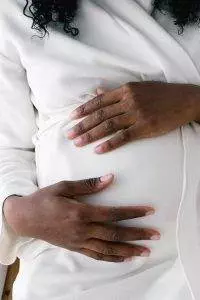
Sudden pain right lower abdomen or pain that starts around your navel? Nausea or vomiting? These may be appendicitis symptoms. Appendix pain is a sign of appendicitis, or an infected and inflamed appendix. Acupuncture and TCM offer an adjunct treatment for appendicitis that can help relieve appendicitis pain.
The appendix is a small, tube-shaped organ that extends off of the lower part of the large intestine. What side is your appendix on? The appendix location is in the lower right quadrant of your abdomen.
What’s appendicitis? Appendicitis causes are generally related to infection and inflammation.
The appendix can become blocked by a bacterial infection, a viral infection, a parasite, or a tumor. Sometimes fecal matter gets into the appendix, causing a blockage.
If the appendix becomes infected and inflamed, it can swell and even rupture; this is often called a “burst appendix,” or ruptured appendix.
If the appendix becomes so swollen that it begins to tear or rupture, stool can leak out into your abdominal area and cause peritonitis, a potentially very dangerous infection.
Acute appendicitis is a medical emergency and requires immediate medical attention.
Studies have shown that acupuncture and TCM treatment can help relieve appendicitis pain and swelling and improve outcomes for patients hospitalized for acute appendicitis.
Appendicitis Symptoms
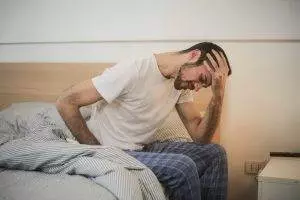
The signs of appendicitis often come on over a short period of time, usually beginning with a sudden pain in the middle of your belly around your navel, and then moving to the lower right side of your abdomen.
Appendicitis symptoms include:
- Sudden pain near or around the navel that migrates to the lower right side
- Sudden pain in the lower right quadrant of the abdomen
- Pain in belly is worse when you cough or are jarred
- Right belly is tender to the touch
- Constipation
- Diarrhea
- Urinary frequency or urinary urgency
- No appetite
- Low grade fever
- Malaise, generally feeling ill
Appendicitis tends to develop through a series of stages. The 4 stages of appendicitis are:
- Early or uncomplicated appendicitis, which is when a blockage has formed and swelling of the appendix begins. At this stage, the pain in the middle of the belly area may be just sort of a vague “stomach ache.”
- The appendix begins to fill with mucus. Without proper blood and lymph drainage, bacteria begin to proliferate inside the appendix.
- The swelling begins to make the tissue of the appendix and the surrounding intestine and bowel walls become stiff, sometimes forming an inflamed mass, which is called an “appendiceal phlegmon.” This can feel like a hard mass in the lower right abdomen when palpated.
- Blocked blood flow causes a lack of oxygen, so the tissues of the appendix become necrotic. At this stage, the wall of the appendix can begin to tear or rupture.
This process usually develops over the course of 12-24 hours. This is why appendicitis is considered a medical emergency. It is very important that anyone experiencing this type of pain and other symptoms seeks urgent care.
Appendicitis Treatments and Appendectomy
Upon being admitted for testing, a person presenting with severe pain in the right abdomen will first need to undergo testing to be sure of a diagnosis of appendicitis.
There are several other conditions which could also cause abdominal pain in this area, including:
- Crohn’s disease
- Mittelschmerz, ovulation pain
- Ovarian cyst that has ruptured
- Ovarian torsion
- Endometriosis
- Ectopic pregnancy
- Pelvic inflammatory disease
- IBD
- Testicular torsion
- Right-sided colitis
- Kidney stone
While undergoing diagnostic testing such as MRI, CT-scan, or ultrasound, it is often common practice for doctors not to administer pain medications, the idea being that to do so might mask symptoms and delay proper diagnosis. This when acupuncture treatment can be particularly helpful. Acupuncture can have a proven analgesic effect for abdominal pain, without any side effects.
In general, appendix surgery is considered the gold standard treatment for acute appendicitis. Appendix removal can be done laparoscopically, or via incision.
Some cases of appendicitis may be treated with antibiotics and other medications over the course of several days or weeks, but often, in a significant number of cases, the appendicitis recurs.
Acupuncture and Chinese herbs can serve as an adjunct treatment for appendicitis patients, helping to relieve abdominal pain, regulate body temperature, and reduce inflammation.
Can Acupuncture Help Appendix Pain?
Appendicitis is an emergency situation, and people should definitely seek immediate medical care if they are experiencing right side abdominal pain and fever.
Acupuncture and TCM herbs can be used as complementary medicine, to help reduce hospitalization time and improve overall outcomes of conventional treatment for appendicitis.
While in some cases, appendicitis surgery may be necessary, there are other options. In some cases a combination of antibiotics to handle the infection, and acupuncture, herbs and moxibustion treatment to help relieve pain and inflammation may help to resolve appendicitis without surgery. This is known as NOTA: non-operative treatment for acute appendicitis.
According to TCM theory, appendicitis is considered to be related to blood stasis and stagnant Qi, as indicated by symptoms like: distended abdomen, nausea and/or vomiting, and a red tongue with a white, greasy coating. If the condition is also characterized by excess heat, then there may also be intense pain and muscle tension in the lower right abdomen, constipation, fever, a dry mouth, and dark-colored urine.
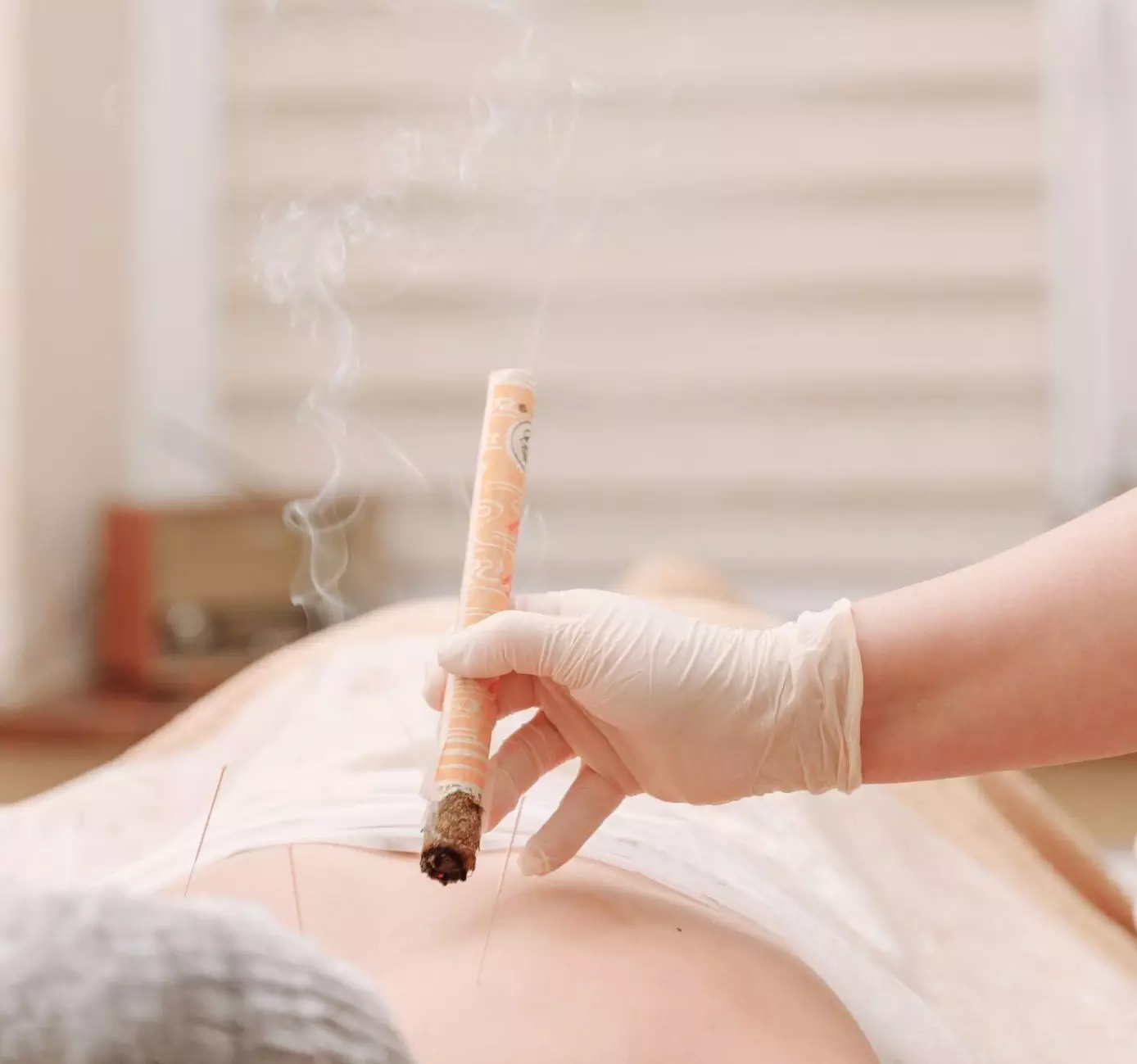
In this situation, an acupuncturist would use acupuncture points targeting the stomach, spleen, and large intestine to help move blood, Qi, and clear heat from the infected area. Moxibustion treatment, which involves burning a small amount of moxa herbs near acupoints, can also help to relieve fever and irritation.
These TCM treatments can help to support and boost the efficacy of conventional medical treatments for appendicitis.
In situations where an appendectomy is indicated, acupuncture and herbs can help speed recovery and help to improve intestinal function after surgery.
One study done on pediatric patients with appendicitis showed that acupuncture helped reduce inflammation and pain.
Another study compared patients hospitalized and treated for appendicitis. One group received antibiotics, pain relief medications, and a special diet. The other group received these treatments, plus acupuncture and herbs. Overall, the patients who received TCM treatment had reduced abdominal pain, more quickly resolved fevers, and were able to leave the hospital days earlier.
Acupuncture, and electro-acupuncture, can also be used to help with recovery and pain relief post-appendectomy, for those patients who do require surgery to remove the appendix.
Acupuncture for Appendicitis Near Me in West Los Angeles
Acupuncture and TCM can often be used in conjunction with conventional medical care as a way to offer additional support for pain relief, recovery, and regaining functionality. In the case of appendicitis, it is vital to seek medical treatment for what can potentially become a life-threatening emergency. Acupuncture and herbs can be used additionally, to help speed recovery from infection, and, when necessary, from surgery. TCM can help patients regain and improve their digestive function.
*This article is for education from the perspective of Traditional Chinese Medicine only. The education provided by this article is not approved by FDA to diagnose, prevent, treat and cure human diseases. It should not stop you from consulting with your physician for your medical conditions. Traditional Chinese Medicine is based on Qi, which is an invisible force that usually cannot be observed by modern science. Because science focuses on testing ideas about the natural world with evidence obtained through observation, these aspects of acupuncture can’t be studied by science. Therefore acupuncture and Chinese herbs are often not supported by double-blind, randomized trials, and they are considered alternative medicine therapies in the United States.
How to Treat Nausea With Acupuncture and TCM
By Xiaomei Cai, L.Ac., Ph.D. and Qineng Tan, L.Ac., Ph.D.
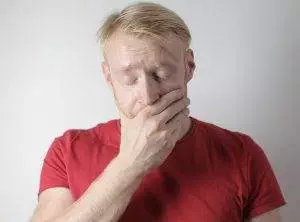
Feeling nauseous, nauseated, queasy? Feel like vomiting or throwing up? Nausea can be brought on by many different health conditions. Acupuncture and TCM can provide nausea help in many situations, whatever the cause of nausea.
Nausea is that feeling that you have to vomit, or throw up. It’s an uneasy feeling that is often referred to as being “sick to your stomach.” Feeling nauseous may or may not precede actually vomiting.
Nausea is a symptom, not a disease in and of itself. There are many different kinds of health issues that can make you feel nauseated, or cause you to vomit.
Symptoms of Nausea
A queasy stomach is often accompanied by other symptoms. Nausea can often include or coincide with:
- Feeling like you are going to vomit
- Stomach ache, pain in belly
- No appetite, stomach turns at the thought or sight of food
- Sweating, clammy skin
- Salivating, swallowing a lot
- Uneasy feeling in the back of your throat
- Contractions of the respiratory or abdominal muscles
- Retching
- Dizziness
- Headache
Sometimes people feel nauseous after eating, or have a headache and nausea, or dizziness and nausea.
Some of the most common causes of nausea are a stomach flu, or gastrointestinal virus, morning sickness during pregnancy, and motion sickness.
There are many reasons why a person may feel nauseated, related to various health conditions.
Acupuncture and TCM provide a very effective way to help relieve nausea caused by all kinds of health issues.
Why Do I Feel Nauseous?
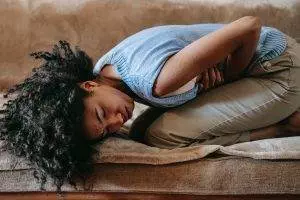
We all know what it is like to feel car sick or have a 24-hour stomach bug that makes us feel queasy and vomit. But sometimes we have recurrent nausea and do not know why.
The cause of nausea can sometimes be hard to pinpoint, if nausea comes and goes, or becomes a chronic, ongoing problem.
Top 10 Causes of Nausea
The medical conditions that most commonly cause nausea include:
- GERD – Acid reflux can cause excess salivation and regurgitation of food
- IBS – irritable bowel syndrome can lead to changing symptoms of nausea, gas, diarrhea, and constipation
- IBD – inflammatory bowel disease like ulcerative colitis can cause nausea, abdominal pain, and diarrhea
- Hepatitis – HBV or Hepatitis C can cause loss of appetite, nausea, and abdominal pain
- Migraines – nausea and vomiting can be part of a migraine headache
- Meniere’s disease – inner ear problem that can cause dizziness, vertigo, and nausea
- Anxiety – anxious feelings, depression, and other mental health issues like claustrophobia or PTSD can cause nausea
- Pregnancy – morning sickness
- Diverticulitis – inflamed sacs in the intestine can cause gas, bloating, and nausea
- Guillain-Barre syndrome – autoimmune disease affecting the neurological system can cause nausea in addition to muscle weakness and fatigue
- HIV/AIDS – people experiencing the acute phase of HIV often feel nauseated and fatigued
Being constipated can cause nausea.
Bacterial meningitis, swelling of the brain that can happen due to a bacterial or viral infection, can cause nausea, vomiting, and fever.
Celiac disease, an autoimmune disorder that affects digestion, can often cause nausea, bloating, and abdominal pain.
People often feel nauseated or vomit when experiencing a gallbladder attack or when passing a kidney stone.
Hormonal changes during PMS, the menstrual period, ovulation, and pregnancy can cause nausea.
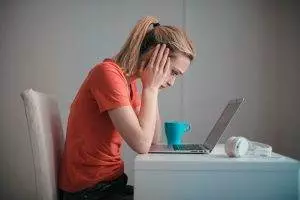
Nausea and vomiting can often be side effects of medications that are used to treat some conditions. Opioid painkillers, in particular, can cause dizziness and nausea.
Stomach ulcers, or peptic ulcers, can cause nausea, as can gastroparesis.
Antibiotics can cause nausea and diarrhea. Even NSAIDs like Ibuprofen and and Motrin can cause nausea or stomach upset. Some blood pressure medications can also cause queasiness.
Feeling nauseous is a common side effect of chemotherapy for cancer treatment.
TCM has acupuncture protocols and herbal formulas to help alleviate the nausea associated with all of the conditions listed above.
Nausea Medicine
Most people probably have OTC preparations to relieve nausea and stomach upset in their medicine cabinet, such as Pepto-Bismol, or Dramamine to prevent motion sickness.
If you seek medical care for recurrent or chronic nausea, you may be prescribed antiemetics (such as promethazine), which block the receptors in the brain that trigger nausea sensation.
Drugs known as prokinetic agents work by affecting the lower esophageal sphincter and moving food more quickly through the digestive system. Erythromycin and domperidone are examples.
Certain antihistamines, like Benadryl, are also sometimes prescribed to help reduce nausea, as they block certain chemical responses and reduce stomach acids that can cause nausea.
More recently, cannabinoids may be used medicinally to help quell nausea. These may be prescribed as a synthetic form of TCH.
While these medications may help to relieve nausea in some cases, they do generally come with side effects, like drowsiness, dizziness, constipation, or vision problems.
Acupuncture is widely considered to be an effective modality to treat nausea, without any side effects.
Can Acupuncture Help Nausea?
One of the foundational principles of TCM theory is that an acupuncturist may use the “same treatment for different diseases.”
This means that while a condition, such as nausea, may be caused by any one of several different internal or external factors, the treatment may be the same. It also refers to the concept that many different types of conditions can be caused by a disharmony in a particular organ system.
Therefore, using acupuncture and herbs to bring balance to a particular organ system can help relieve many disorders that would be considered separate and distinct from one another in modern conventional medicine.
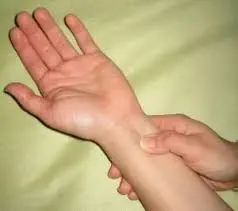
There are several key acupuncture points that will have a positive effect on the reduction of nausea, and no matter what is the cause of nausea, they will work in many cases to alleviate nausea in the short term. The point known as P6, in particular, is a classic point for quickly quelling queasiness.
Beyond that, a TCM practitioner will look carefully at other symptoms to find the root cause, which may be related to a deficiency of stomach or spleen Qi. These are the organs primarily responsible for the processing of food. If there is too much heat or phlegm in the stomach or spleen, there will be indigestion.
Emotional factors can also affect the stomach Qi. Worry, repetitive thoughts and rumination are associated with stomach problems in TCM. Acupuncture can also help to relieve the physical and emotional symptoms of anxiety.
The liver also plays a role in digestion, by producing bile. So when any one of these organs is stagnant or not functioning smoothly, it can cause indigestion and the reversal of stomach Qi – causing the energy to move upwards rather than downwards.
One study of patients suffering from mild to moderate nausea and dyspepsia who had not responded to conventional medications showed that symptoms were greatly reduced after just three acupuncture sessions.
Acupuncture can help relieve nausea caused by morning sickness and other conditions because it affects the release of endorphins and ACTH, a pituitary hormone that inhibits the vomiting trigger response.
A research study that looked at thousands of cases found the acupuncture was effective at reducing nausea due to morning sickness, as well as postoperative nausea and chemotherapy induced nausea.
Chinese herbs can also be used to help balance the organ Qi and to relieve stomach upset. Your acupuncturist will create a formula that addresses both nausea symptoms and the deeper issues that are the cause of nausea.
Ginger is also one of the most effective natural remedies for nausea. A few slices of fresh ginger, with the skin still on, steeped in hot water as a tea can help relieve nausea in many situations.
Acupuncture Near Me for Nausea in Los Angeles
TCM offers nausea help for people of all ages, with all types of health issues. Drs. Tan and Cai at Art of Wellness in West Los Angeles have 35 years of experience helping people with all types of gastrointestinal disorders, hormonal conditions, and autoimmune conditions. Our expertise in reproductive health allows them to help women who experience morning sickness or nausea during ovulation or menstrual issues. We also have extensive experience helping cancer patients who are undergoing chemotherapy feel more comfortable and deal with side effects of cancer treatment.
*This article is for education from the perspective of Traditional Chinese Medicine only. The education provided by this article is not approved by FDA to diagnose, prevent, treat and cure human diseases. It should not stop you from consulting with your physician for your medical conditions. Traditional Chinese Medicine is based on Qi, which is an invisible force that usually cannot be observed by modern science. Because science focuses on testing ideas about the natural world with evidence obtained through observation, these aspects of acupuncture can’t be studied by science. Therefore acupuncture and Chinese herbs are often not supported by double-blind, randomized trials, and they are considered alternative medicine therapies in the United States.
How to Treat Gallbladder Pain With Acupuncture and TCM
By Qineng Tan, L.Ac., Ph.D. and Xiaomei Cai, L.Ac., Ph.D.

Pain on right side abdomen? Sudden, sharp right abdomen pain? This could be a sign of a gallstone or gallbladder issue. Gallbladder attacks can cause severe gallbladder pain. Acupuncture and TCM can provide an alternative or adjunct treatment for gallstones symptoms.
The gallbladder is a small organ located on the right side of your abdomen, under the liver. The liver produces bile, a liquid that helps break down fats into fatty acids. The gallbladder stores bile and releases it into the small intestine as needed, to help with digestion.
When the bile that your body produces has too much cholesterol or bilirubin in it, or when bile is not draining out of the gallbladder properly, it can become too concentrated and begin to harden into a solid.
Gallbladder pain usually occurs because a person has gallstones, which are just what they sound like: little stones that develop inside the gallbladder and are made up mostly of cholesterol. The medical term for gallstones is “cholilithiasis.”
Many people have gallstones and are not aware of it. It is possible to have gallstones with no symptoms at all.
Top 5 Gallstone Symptoms
People who have gallbladder disease or gallstones are likely to experience a condition known as “biliary colic.” This means that they have an intolerance for fatty foods and may experience dyspepsia, nausea, and/or bloating when they eat something that disagrees with them.
Severe, sharp right side stomach pain is the most common sign of a gallbladder attack, which is when a gallstone becomes lodged in one of the small tubes or ducts that lead to and from the liver, gallbladder, and pancreas.
Gallbladder symptoms may include:
- Pain in lower right abdomen
- Nausea and/or vomiting
- Yellow skin and/or yellow eyes, jaundice
- Fever and/or chills
- Brown pee, brown urine, light-colored poop
Sometimes gallbladder pain can refer to the right shoulder, or between the shoulderblades.
Gallbladder pain can also happen due to inflammation of the gallbladder. This condition is known as cholecystitis and occurs when a gallstone blocks the duct that leads out of the bladder, causing bile and bacteria to build up and become infected.
Stones can sometimes become lodged in the common bile duct, which not only causes pain, but can lead to pancreatitis. Gallstones are the primary cause of acute pancreatitis, in which the pancreas becomes irritated and inflamed due to a backup of bile and/or digestive enzymes.
The pain of a gallbladder attack is unignorable. If it doesn’t go away within a few hours, most people choose to go to the emergency room for urgent care.
Gallstones may pass on their own, or drugs are sometimes used to help dissolve the gallstones. These drugs can be expensive, and sometimes cause problems like atherosclerosis, or fatty buildup in the arteries.
When gallstone pain comes and goes, and the gallstones are present but not causing the blockage of a duct, usually pain management and patience are the only treatment.
If gallbladder issues keep coming up, the typical medical treatment is gallbladder surgery.
Acupuncture can offer an alternative treatment to help relieve gallbladder pain. TCM is considered an effective treatment for biliary colic due to gallbladder disease.
Gallbladder Removal
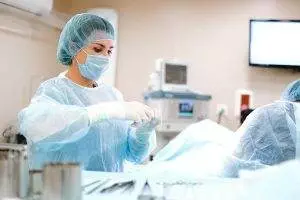
It is very common for people presenting with acute pancreatitis or a gallbladder attack to have a cholecystectomy, or gallbladder removal. Over 300,000 cholecystectomies are performed in the U.S. each year.
While this gallbladder surgery is usually done laparoscopically and is minimally invasive, there are disadvantages to living without a gallbladder.
Some people have what is known as postcholecystectomy syndrome, in which they continue to experience pain on right side abdomen, heartburn, nausea, indigestion, and vomiting, even though their gallbladder is gone.
Some research studies have suggested that gallbladder removal may not be necessary or desirable for everyone. It may be worth considering alternative or adjunct gallbladder pain treatment with TCM and acupuncture.
Can Acupuncture Help Gallbladder Symptoms?
Chinese medicine has been used to treat gallstones for thousands of years, without surgery.
According to TCM theory, the gallbladder is the Yang organ that ideally works cooperatively and in harmony with the Yin liver. The gallbladder is an extraordinary organ in that it is part of the digestive system, but it never comes in direct contact with the food you eat. It stores and secretes bile to help break down fats.
In TCM, we consider the gallbladder to represent the part of our nature that makes decisions, takes action, and feels inspired. When the liver and the gallbladder are not functioning smoothly, we may feel frustrated, angry, and depressed. Repressing anger can exacerbate gallbladder problems, as can eating the wrong foods.

In TCM, the gallbladder is associated with spring, and the wood element. It is best nourished with lots of dark, leafy greens, herbs, roots, and green tea. Eating too many fatty, fried foods, and drinking too much alcohol can have a very negative effect on both the liver and gallbladder.
The stimulation of acupoints along the gallbladder meridian can help to regulate the sphincters of the gallbladder and its action, and help to promote the secretion of bile so that it does not remain stagnant inside the gallbladder.
Acupuncture can also have an analgesic effect that may even be superior to that of NSAIDs pain relief medications, without any of the side effects that may occur with regular use of these drugs.
Acupuncture can also be used to treat chronic cholecystitis, the chronic inflammation of the gallbladder due to infection. TCM treatment can help reduce inflammation and improve immune function so that infections can be more easily fought off.
Acupuncture and TCM can also be used as an adjunct treatment to help boost the efficacy of conventional medications. One study showed that patients who were given cefodizime for chronic cholecystitis and also received acupuncture had a 98% effective rate, as opposed to patients who received the medication only, who had only a 50% effective rate.
There are many Chinese herb preparations designed to help with gallstones. These formulas are based on TCM theories related to clearing the stagnation of Qi and blood in the liver and gallbladder, removing dampness and heat and treating yin deficiency.
These herbs have been shown to help discharge gallstones, control the metabolism of bilirubin, and help to prevent the formation of new stones in the future.
Acupuncture Near Me for Gallbladder Pain in West Los Angeles
Acupuncture and TCM can provide natural treatments for gallstones and many other problems related to the digestive system, such as diarrhea, constipation, Crohn’s disease, colitis, IBS, diverticulitis, and celiac disease. If you are experiencing abdominal pain and other digestive symptoms, consider consulting with a TCM practitioner. Acupuncture can help prevent conditions like gallstones from getting worse.
*This article is for education from the perspective of Traditional Chinese Medicine only. The education provided by this article is not approved by FDA to diagnose, prevent, treat and cure human diseases. It should not stop you from consulting with your physician for your medical conditions. Traditional Chinese Medicine is based on Qi, which is an invisible force that usually cannot be observed by modern science. Because science focuses on testing ideas about the natural world with evidence obtained through observation, these aspects of acupuncture can’t be studied by science. Therefore acupuncture and Chinese herbs are often not supported by double-blind, randomized trials, and they are considered alternative medicine therapies in the United States.